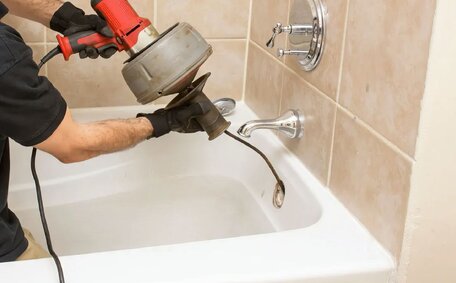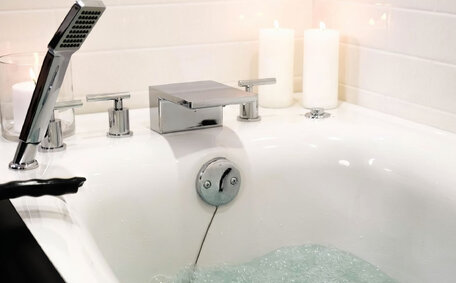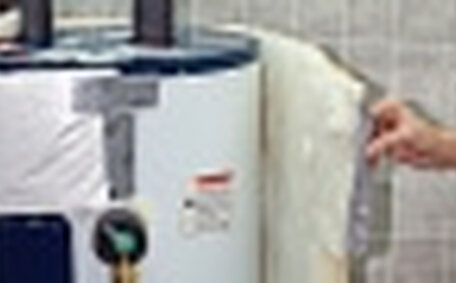Introduction to Drain Management in Restaurants and Cafes
Effective drain management is imperative for the smooth operation of restaurant and cafe businesses. Blocked drains issues can cause severe disruptions to business operations and pose hygiene risks if grease, fats, and food debris accumulate in your plumbing system. Preventing drain blockages requires implementing planned maintenance strategies to keep drains and pipes clear.
The plumbing system in commercial food service kitchens suffers constant pressure from waste, grease, and high volumes of liquid. Maintaining a well-functioning drainage system is essential to prevent blockages. If neglected, kitchen drain blockages from oils grease fog can happen quickly, resulting in foul odours, leaks, flooding, and even complete closure during repairs.
Knowing the usual causes of drain blockages and implementing mitigation strategies such as regular cleaning, installing grease traps, and making small operational alterations can spare restaurants the cost and inconvenience of emergency callouts. This guide covers those key aspects of smart drain management for food service establishments.
Common Causes of Blocked Drains in Restaurant Kitchens
- Grease buildup - As oils and fats cool and pour into drain pipes during food preparation, they congeal into solid grease adhering to pipe walls.
- Food scraps - Bits of food waste like coffee grounds, eggshells, and other debris wash down drain, accumulating over time.
- Foreign objects - Things like straws, napkins, and bottle caps frequently get flushed accidentally.
- Tree roots - Over time, plant roots grow towards pipes seeking water, eventually breaking pipes.
- Deterioration - Old, corroded pipes crack, allowing built-up grime to cause clog points.
Grease buildup is a major contributor to drain blockages, solidifying and trapping other waste, thus highlighting the importance of addressing this issue promptly. Even small amounts can accumulate over days, affecting your drains pipes. Substances like coffee grinds can travel up drain, sticking to the layer of grease and growing the mass that ends up blocking pipes.
Drains are prone to rapid blockage under the high load conditions typical in restaurants. Without proper garbage disposal habits, kitchen drains get clogged with food waste build-up. Once your sink starts draining slowly, it’s a sign that you’ve got grease fog accumulation as an underlying issue.
Consequences of Blocked Drains
Blocked drains can severely disrupt restaurant operations with overflow and odours that harm the diner’s experience. Your customers, observing overflowing sinks or noticing foul smells, may get back to you with concerns of uncleanliness, resulting in damage to your reputation.
Blockages also lead to increased pressure in the pipes, causing leaks and potential flooding that can damage food supplies and equipment. Appliances like dishwashers and sinks will become unusable until resolved. With kitchen operations in your restaurant or bar severely impacted or halted, it’s essential to address the problem soon possible to prevent loss of revenue and high emergency repair costs.
As well as financial impacts, blocked drainage systems that haven’t had maintenance carried out present health and safety hazards. Water contaminated from a backed-up system can spread across all your kitchen floors, risking bacterial transmission and causing slip injuries. Flies and other vermin are also attracted to areas with sitting water and your food waste buildup.
Untreated plumbing issues, such as drain blockages, can escalate significantly over time. Small clogs that begin slowing drainage can escalate into significant issues with a constant amount fog and solids hanging onto existing accumulations. Pre-empting problems before they escalate saves time money and ensures the stability of your business in the long run.
Signs of Blocked Drains to Watch Out For
Be vigilant for early warning signs that suggest a blocked drain is developing:
- Slow or stagnant water implies that your downpipes may be clogged
- Gurgling noises coming from drains
- Unpleasant sewage odours around sinks, floor drains, or blocked toilets
- Toilets with a back up of dirty water
- Pools of water gathering around outlet pipe areas
- Presence of roaches, flies or other vermin sniffing out food
Sinks and sewer drain should drain quickly. Bubbling or loud gurgling noises suggest obstructions, indicating that waste not only goes down but may also get stuck further down the pipe. Foul smells also emerge when waste and dirty water sits stagnant.
Slow drainage generally worsens over time due to substances adhering to existing accumulation. Addressing minor problems early makes clearing blockages easier and may prevent the need for drain relining or complex plumbing interventions.
Trust your senses; they are often the best way to detect issues near sinks and drains — strange smells or sounds always warrant further inspection. At the very first sign of plumbing problems, please call professional drain plumbers to investigate for preventative maintenance.
Effective Strategies to Prevent Blocked Drains
Implement these key measures to keep your drain blockages to a minimum:
- Install sink strainers and floor drain covers to catch food scraps and debris.
- For effective grease interception and clog prevention, install grease traps conforming to local size regulations.
- To remove leftover food waste from plates before washing, scrap and clean your dishes thoroughly.
- Avoid pouring grease oil down your drains or pipes as this action can lead to severe clogs.
- Place trash bins near your sinks for easy food scrap disposal.
- Check and clean sinks and drain strainers daily.
- Develop a trap maintenance routine, including professional drain inspections, which should be scheduled every three months.
- Use plunger or boiling water weekly to break up small buildups.
- Ensure your staff are fully educated on best practices for kitchen waste and liquid disposal.
- Consider installing a commercial grade garbage disposal to grind up waste.
Maintaining practical commercial kitchen habits, such as routine drain clearing and professional advice, ensures unobstructed pipes for seamless operations.
Installing and Maintaining Grease Traps
Grease traps are vital equipment in commercial kitchens, separating fats, oils and grease (FOG) out of sink wastewater before it enters sewer lines. Food scraps, batter, sauces, and more, when washed down, contribute to what goes into the drains. Grease solidifies in pipes, sticking to walls leading to major blockages.
Grease traps prevent oils and FOG from reaching your main sewer by separating and storing them for proper disposal, thus avoiding downstream buildup. However, it’s just as vital to clean your grease traps diligently, ensuring their maintenance.
Choosing Suitable Traps
Several types of grease trap systems are available. Gravity grease interceptors installed underground externally are ideal for larger high-volume kitchens. Smaller compact systems like automatic grease removal units reside internally, using mechanisms to remove FOG.
To properly size your grease trap for your kitchen depends on factors like meals served per day, number of sink fixtures, and menu type. Our specialists consider all details in recommending, designing and installing effective systems meeting Australian Standard AS3500 and Sydney Water regulations.
Importance of Regular Cleaning
If not serviced regularly, grease traps will fill up over time despite intercepting FOG. Typically, more than just a superficial cleaning, a full deep cleaning is required at least quarterly. Neglecting the cleaning of your grease trap allows grease to enter sewer lines, risking blockages downpipe.
Cleaning involves complete pump out and scrubbing to remove solid grease, fats and food buildup. We safely dispose extracted waste before refilling traps to continue working order. Interim monthly inspections, spot cleans and bacterial treatments optimise functionality too.
If you’re uncertain about arranging suitable grease trap or duct cleaning for your kitchen, see our expert team for guidance. Protecting infrastructure keeps plumbing and drain systems operating smoothly.
Best Practices for FOG Disposal
Proper disposal of fats, oils, and grease is essential in preventing restaurant drain blockages. Allowing FOG to go down drains can damage the plumbing and lead to major pipe blockages and sewer issues. Here are best practises:
- Collect all used fats oils grease into sealed containers, never pouring down sinks.
- Scrape plates and cookware thoroughly, thinking 'do I remove all fats and food residue?' before washing.
- Store FOG in leakproof containers in a cool, ventilated area.
- Contact licenced waste collectors to dispose of accumulated grease oil (FOG). Most councils offer restaurant grease recycling programmes.
- Train staff on scraping, drying, and FOG storage protocols.
- Post signs near sinks prohibiting oil and grease pouring.
With proper grease handling procedures, restaurants prevent pipe damage, health code violations, and maintenance issues. Our plumbers can advise on compliant grease disposal systems.
Natural Drain Cleaning Solutions
Using natural, non-toxic drain cleaners is an eco-friendly way to help clear simple clogs without damaging pipes.
Baking Soda and Vinegar
Baking soda is alkaline and reacts with the acidity of vinegar to produce carbon dioxide bubbles. Baking soda is alkaline and reacts with the acidity of vinegar to produce carbon dioxide bubbles.
The fizzing action can loosen clogs; follow with hot water after 5-10 minutes.
Boiling Water
Boiling water melts and loosens grease while killing bacteria in pipes. Boiling water melts and loosens grease while killing bacteria in pipes. Boiling water additionally flushes away hair and soap residue.
Repeat weekly.
Salt and Baking Soda
Mix 1⁄4 cup salt with 1⁄4 cup baking soda and pour down sink. The abrasive texture scrubs inside your pipes. Follow with a tea kettle of boiling hot water to push through the mixture.
Encountering serious drain blockages? Simply call us and our professional plumbers will be ready to assist you. We use advanced electric drain augers to thoroughly clear out grease, tough sludge and tree root infiltrations without damaging pipes.
Compliance With Drainage Regulations
Restaurants and cafes must adhere to local plumbing drainage regulations and protect the sewer system by following wastewater regulations to operate legally and prevent environmental harm. Failing to meet codes regarding grease trap installation or illegal dumping of fats, oils and grease (FOG) carries hefty fines and risks losing operating permits.
Key responsibilities include:
- Installing compliant grease traps sized for the kitchen’s sink capacity.
- Arranging grease trap cleaning by licenced trade waste collectors every three months, or more frequently if needed to prevent grease overflow.
- Scrapping plates, using drain screens and educating staff to prevent fats and solids flowing into drains.
- Collecting used cooking oil in storage drums for collection by recycling companies, not tipping down sinks.
- Maintaining detailed grease trap cleaning and FOG disposal records for inspection by Sydney Water and council auditors.
Neglecting any obligations leads to contamination of the public sewer. Beyond fines, ignored drain regulation breaches can also lead to prosecution or loss of operating licences. Partnering with knowledgable plumbers ensures full compliance.
When to Call a Professional Plumber
While implementing proactive drain maintenance is crucial, knowing when to enlist professional help is also important to truly protect operations.
Contact emergency plumbers immediately if you experience:
- Complete sink or pipe blockages not clearing after attempts at plunging or using drain cleaners
- Backed up drains flooding your kitchen or causing any issues
- Strong foul odours permeating dining areas
- Public health violations from inspectors related to improper grease levels or contaminated water runoff
Rather than waiting for major disasters though, it’s wise establishing relationships with reputable plumbers to support your drain management. This includes:
- Installing suitable grease traps custom designed for your specific kitchen’s size and capacity
- Quarterly scheduled maintenance cleaning grease traps and clearing drains before issues arise
- FOG waste collection and disposal
- Sewer line inspections checking for damage or signs repairs are needed
- Drain scoping to identify and clear embedded blockages
- Ongoing compliance checks ensuring you meet all legal obligations
For more information and a no obligation consultation in restaurants and cafes, visit our website to meet our fully licensed technicians. Visit our contact page anytime for proactive maintenance or rapid response emergency repairs when drains fail you.
Best Practices to Maintain Drain Health
Implementing an ongoing drain maintenance routine is the most reliable way to sustain long-term drain health and prevent blockages in a commercial kitchen.
Key best practises include:
- Installing suitable grease traps and filters to intercept fats, oils and food solids before entering drains
- Establishing a schedule for professional drain inspections and cleaning every 3 months to clear any buildup
- Educating all staff on proper food scrap and liquid waste disposal protocols
- Daily drain strainer cleaning and hot water flushing to remove debris before it accumulates
- Checking for leaks, cracks or other pipe deterioration during routine maintenance
- Following local council regulations and compliance reporting regarding grease traps, FOG disposal etc.
- Keeping detailed maintenance logs for all drain clearing and grease trap pump outs
A proactive strategy prevents emergency blockages, potential closure, maintenance headaches, and environmental penalties. Even small inconsistent drain problems can be a sign that thorough maintenance can resolve debris buildup requiring attention.
Our licenced plumbers specialise in scheduled commercial drain care. We customise maintenance plans meeting your specific kitchens needs while optimising operational efficiency.
Dont wait for catastrophic drain failures. Contact us today to implement reliable safeguards keeping kitchen infrastructure and workflows running smoothly.






